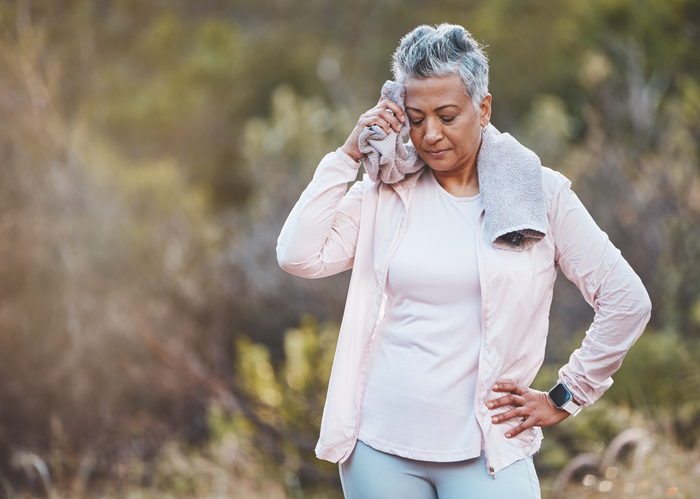By Nancy Alexander, PT, CSCS
Post-exercise soreness can be a part of every exercise program. Perform a new routine, perform it at a new intensity, or just do an activity you’re not used to doing and you can spend the next day stiff, sore and moving slowly. What’s behind this and how can we manage it? Let us explore this more.
There are varied theories as to why we get sore after a workout but there is one thing we do know. Delayed onset muscle soreness is the result of inflammation from damaged tissues. It happens, and it can happen frequently. Chances are you haven’t hurt yourself seriously. See below if you suspect this.

Post-exercise soreness can just be the result of a hard workout. And the following 5 ways to ease soreness can help you prevent soreness and/or move this process along to get you back on track quicker.
Here are 5 ways to ease soreness:
- Perform a dynamic warm-up before your workout or vigorous activity. Soreness may be due to inflamed fascia which is the tissue around and between muscles in your body. Think of it as sleeves around your muscles. This thick connective tissue likes to be moved in different directions and a dynamic warm-up helps you do just that. It improves your body’s ability to tolerate the workout ahead.
- Honor your fitness level. Adjust your workout in keeping with your abilities at the moment. Try not to jump right back in to a workout you did 2 months ago, or even 2 weeks ago. This is even more important as we age as your structures typically are not as supple as when you were young. Modify your workout or choose an activity less vigorous for now. If you still get sore, don’t push through it during the next workout. This increases your risk of injury. Instead, rest more and allow your body to recover before you try it again. Once you get stronger and more physically fit over time, you can then try to resume your previous level of activity.
- Eat well and sleep well. Sure, massage guns or medications may help, but please consider healthier alternatives such as eating more protein and staying well hydrated. Try to get enough sleep too to aid in tissue recovery. These healthier alternatives also aid in decreasing your risk of injury.
- Engage in relative rest. You may do more harm with vigorous workouts as noted above, but not doing anything at all is not the best alternative either. Instead, move but do so at a low intensity until soreness subsides. This may include walking, swimming, or light stretching. Gentle movement helps improve circulation and that brings oxygen and nutrients to damaged tissues thus aiding in your recovery.
- Make time for your recovery. Modalities such as cold, heat, and medications like NSAIDs (non-steroidal anti-inflammatory drugs) can help you feel better but they do not treat the strained muscle or fascia itself. It can be hard but respect the time it takes for your body to heal.
Soreness is one thing but what if it is an injury that requires special attention. What if it’s more than just soreness? Consult your physician right away if:
- You experience sudden or sharp pain when exercising at only one part of your body.
- Have decreased ability to move a specific part of your body.
- Experience pain in a specific area that consistently prevents you from falling asleep or staying asleep.
- You experience no pain relief after several days of rest and over the counter anti-inflammatory medications.
You have likely picked up on the fact that a more serious injury is usually local in nature versus post-workout soreness which is more global. In other words, you tend to feel post-exercise soreness in multiple areas of your body. Certainly, if you have any concerns that any pain or soreness is not acting or progressing as expected, seek out medical attention.
Post-workout soreness is common and often the best approach is to be reasonable with your fitness level and expectations. Rely on known and trusted ways to help your body heal as discussed above. Your body is a miracle. Support its ability to heal and quickly get back to those activities you enjoy.

This article is just what I needed!! I will definitely try some of the suggestions!! Thanks!!
Jeanette
You’re welcome Jeanette! Please let me know how it goes for you. Be well.